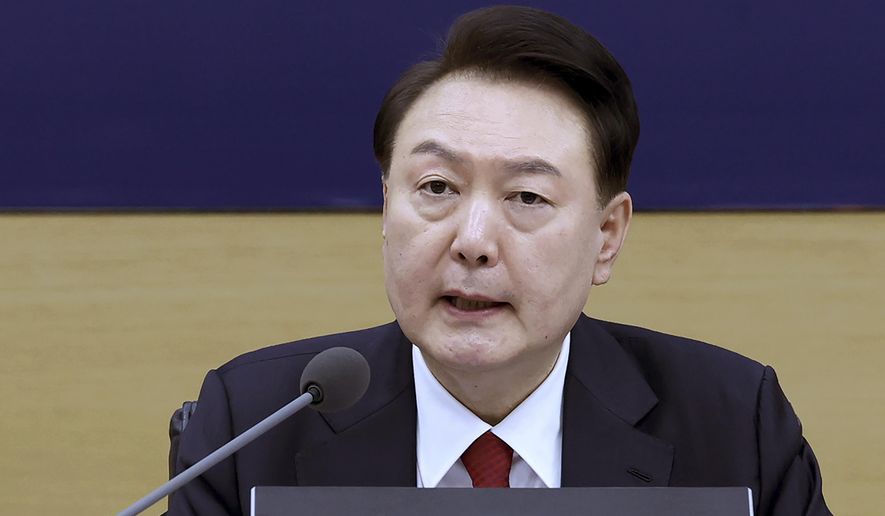
By Hyung-jin Kim - Associated Press - Thursday, April 4, 2024
SEOUL, South Korea (AP) — South Korea’s president met the leader of thousands of striking junior doctors on Thursday and promised to respect their position during future talks over the government’s contentious push to sharply increase medical school admissions.
The meeting between President Yoon Suk Yeol and Park Dan, head of an emergency committee for the Korea Intern Resident Association, was the first of its kind since more than 90% of the country’s 13,000 trainee doctors walked off the job in February, disrupting hospital operations.
During a lengthy televised public address Monday, Yoon defended his plan to recruit 2,000 more medical students each year, from the current cap of 3,058. But he said his government remains open to talks if doctors come up with a unified proposal that logically explains their calls for a much smaller hike of the enrollment quota.
On Thursday, Yoon and Park met for more than two hours, during which “the president said he would respect the position of trainee doctors in the event of talks with the medical circle on medical reform issues including an increase of doctors,” according to Yoon’s office.
It didn’t say whether the government plans any immediate talks with the doctors and whether Yoon’s comments would mean he’s willing to lower the size of his proposed medical school admission increase. But Yoon has faced calls from many, including some in his own conservative ruling party, to make concessions as the party’s candidates face an uphill battle against their liberal rivals ahead of next week’s crucial parliamentary elections.
During the meeting, Yoon also listened to Park’s views on problems facing South Korea’s medical system, and the two exchanged opinions on how to improve working conditions for interns and medical residents, Yoon’s office said in a statement.
Yoon has said the 2,000-student enrollment increase is the minimum necessary, given that South Korea has one of the world’s most rapidly aging populations and its doctor-to-patient ratio is the lowest among advanced economies.
But many doctors have argued that universities can’t deal with such an abrupt increase in the number of students, and that it would ultimately undermine the quality of the country’s medical services. But critics say doctors, one of the best-paid professions in South Korea, simply worry that the supply of more doctors would result in lower future incomes.
Public surveys show that a majority of ordinary South Koreans support Yoon’s plan. The doctors’ strikes have triggered hundreds of cancelled surgeries and other medical treatments at hospitals and deepened worries about prolonged medical impasse. Observers say ordinary people are increasingly fed up with the protracted confrontation between the government and doctors and want the strikes to end.
Kenya: Health Crisis Persists in Kenya As Doctors Reject Govt Offer
Nairiobi — The health crisis will persist in Kenya after doctors rejected a government offer aimed at ending two-week-long strike that has severely disrupted health services.
Abidan Mwachi, Chairman of the Kenya Medical Practitioners, Pharmacists, and Dentists Union (KMPDU), announced the rejection on social media platform X, stating firmly, "We decline these proposals in total," citing the government's failure to fulfill its promise to pay salary arrears.
The strike, initiated on March 15 by the KMPDU representing more than 7,000 members, demanded the payment of salary arrears and immediate hiring of trainee doctors, among other grievances.
In response, the government announced measures to address the doctors' demands, claiming that salary arrears had been settled and trainee doctors would be hired starting Thursday with a budget allocation of Ksh2.4 billion ($18.39 million).
However, Mwachi's rejection underscores the ongoing discord between doctors and the government, prolonging the healthcare crisis, with patients struggling to access care.
Rooted in a 2017 collective bargaining agreement (CBA), doctors' demands include adequate medical insurance cover for themselves and their dependents, along with addressing salary payment delays and compensating doctors pursuing higher degrees while working in public hospitals.
Kenya's health sector, plagued by funding shortages and staffing deficiencies, has endured recurring strikes.
The current standoff exacerbates the disruption in medical services, amplifying concerns over the country's healthcare infrastructure.
No comments:
Post a Comment